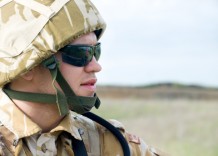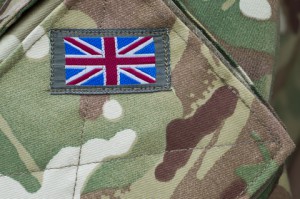Veterans' health and wellbeing
Module created September 2012 - currently under review

This resource has been developed to help health workers in the community better understand the specific health and wellbeing issues that apply to Veterans and their families. The development of this resource has been funded by the Welsh Government. The resource consists of:-
- An educational module
- An information sheet developed by WaMH in PC
- Patient information leaflets
- A links page to sources of support
- A PowerPoint presentation (for GP practice based education)
- Suggestions for simple practice interventions
Veterans in the community
A Veteran is defined as anyone who has served in the Armed Forces for at least one day. This service can be in the Regular Armed Forces or the Reserve. The term also applies to Merchant Seafarers or fishermen if they worked alongside the Armed Forces in conflict situations. Whilst still in the Services their health needs are coordinated by the Ministry of Defence. The families of Service personnel remain within the NHS.
In the UK as a whole there are approximately 5 million Veterans. This makes up around 8% of the population therefore a medium sized GP practice of 6000 patients would have approximately 480 Veterans registered. The prevalence may be higher in areas around large Barracks.
The Veteran status of an individual may not be known to a health or social care worker, the individual may not consider it relevant to disclose. Where appropriate ask, “have you ever served in the Armed Forces” as some ex-service personnel do not consider themselves Veterans. GPs in Wales have been advised to include a clinical code in their patient’s electronic record, either 13q3 Served in armed forces or Ua0T3 Served in armed forces.
Why is it important to identify Veterans?
Most Veterans will have health and social needs in common with the general population. There are however large numbers of Veterans who will have physical or mental health needs directly related to their service. The UK government has launched the Armed Forces covenant with the principle that the Armed Forces community as a whole should not be disadvantaged because of its military experience.

What is the Armed Forces Covenant?
The Covenant sets out the relationship between the Nation, the State and the Armed Forces. It recognises that the whole nation has a moral obligation to members of the Armed Forces and their families, and it establishes how they should expect to be treated. It exists to re-dress the disadvantages that the Armed Forces community faces in comparison to other citizens, and to recognise sacrifices made. In some cases this will require special consideration, especially for those who have given the most, such as the injured and the bereaved.
The Welsh Government has also recognised the need and, amongst other initiatives, has supported the launch of Veterans' NHS Wales.
“Our servicemen and women do an outstanding job and we owe veterans a debt of gratitude and a duty of care, particularly when veterans develop health problems as a result of their military service." Lesley Griffiths AM, Minister for Health and Social Services (2013), stated that she takes her responsibilities for veterans’ health seriously and is committed to ensuring a range of high quality services are available to provide the treatment they deserve.
Key to the Welsh Government’s work in this area is the Veterans' NHS Wales. The Welsh Government is investing £485,000 each year in this new NHS service, which is being developed and implemented across Wales as a Hub and Spoke Model with a specialist therapist in each Local Health Board (LHB). This will provide expert treatment locally for veterans. Further information on the service is available here.
"As a result, there will be a specialist out-patient clinic in each LHB providing expertise and care for veterans, allowing them to access services as close to their home as possible”.
Statement courtesy of Department of Health and Social Services, Welsh Government.
Furthermore the Welsh Government has issued a health circular on Priority Treatment which extends the longstanding priority given to war pensioners, to all service personnel
The two key points from the circular are:
-
When referring a patient who they know to be a veteran for secondary (more specialist) care, GPs have now been asked to consider if, in their clinical opinion, the condition may be related to the patient’s military service. Priority treatment ONLY applies to conditions which are related to a veteran’s service. Where this is the case, and with the patient’s agreement, it should be made clear in the referral.
-
Where secondary care clinicians agree that a veteran’s condition is likely to be service-related, they have been asked to prioritise veterans over other patients with the same level of clinical need. Veterans will not be given priority over other patients with more urgent clinical needs. It is for the clinical practitioner to decide, on the balance of probabilities, whether a veteran’s condition is related to his/her service.
When referring a Veteran for further care, for a condition that may be considered related to their service, the following line may be used to request priority treatment:-
This patient is a military veteran. I consider that his/her current condition may be related to military service. This referral should be considered for priority treatment under Welsh Health Circular WHC (2008) 051
The Armed Forces covenant extends beyond healthcare and in June 2011 the Vale of Glamorgan launched the first Welsh community covenant.
Identifying the individual as a Veteran can therefore help with appropriate prioritisation of access to services and ensure that potential mental and social issues are explored. Sources of support can be signposted and the health and wellbeing of the Veteran can be seen in context.

